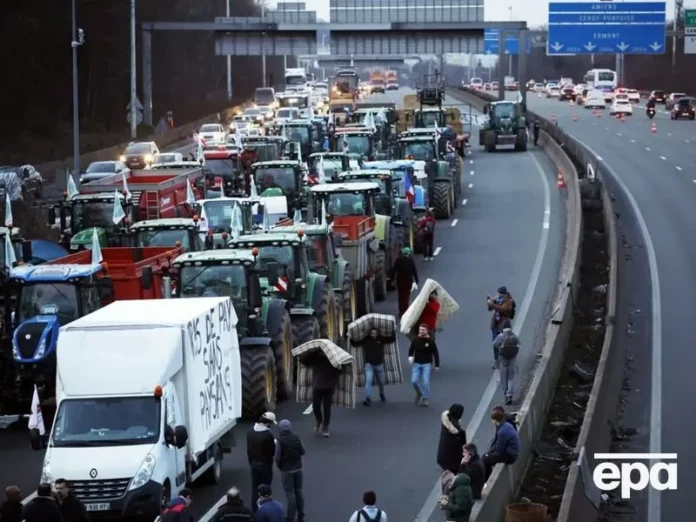On January 29, farmers in the roads around the capital of France, Paris, took to the streets, partially blocking traffic on busy highways with their agricultural machinery. This was reported by BBC. The French farmers’ action, called «Siege of Paris», is related to their dissatisfaction with a number of issues, including falling incomes, increasing bureaucracy, and competition from imported supplies. Dozens of tractors can be seen in photos published by the AFP news agency.
The protest, which started on Monday, has caused major disruptions in and around Paris, with traffic jams and delays reported on major roads. The farmers are demanding that the government take action to address their concerns and provide support for their struggling industry.
The main issue driving the farmers’ protest is the decline in their incomes. Many farmers have been struggling to make ends meet due to low prices for their products and increasing production costs. This has been exacerbated by the rise of large-scale industrial farming and the influx of cheap imported goods, which have flooded the market and made it difficult for small-scale farmers to compete.
In addition, the farmers are also frustrated with the growing bureaucracy and regulations that they have to deal with. Many feel that the government is not doing enough to support the agricultural sector and is instead burdening them with unnecessary paperwork and regulations.
The «Siege of Paris» is not the first protest by French farmers in recent years. In 2015, they blocked roads and highways with their tractors to protest against falling prices and increasing competition. The government responded by offering financial aid and subsidies to farmers, but many feel that these measures have not been enough to address the underlying issues.
The French government has promised to announce new measures to support the farming industry on January 30. However, the farmers have stated that they will continue their protests until they see concrete actions being taken.
The protests have received mixed reactions from the public. While some have expressed sympathy for the farmers’ struggles, others have criticized the disruption caused by the protests. However, it is important to remember that the farmers’ livelihoods are at stake and they are fighting for their survival.
The «Siege of Paris» has also sparked a debate about the future of agriculture in France and the role of the government in supporting this vital industry. Many are calling for a more sustainable and fair agricultural system that prioritizes the well-being of farmers and the environment over profits.
In the midst of all this, it is important to remember the crucial role that farmers play in our society. They provide us with the food we eat and are the backbone of our economy. It is essential that their voices are heard and their concerns are addressed.
In conclusion, the «Siege of Paris» is a powerful reminder of the challenges faced by farmers in France and around the world. It is a call to action for the government to take concrete steps to support this vital industry and ensure a sustainable future for our food supply. Let us hope that the protests will lead to positive changes and a brighter future for French farmers.

